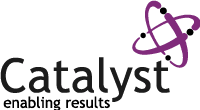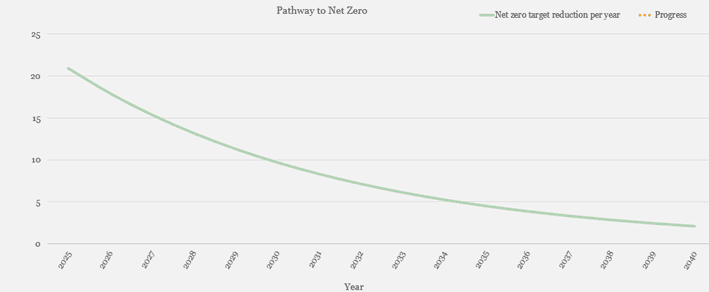Carbon Reduction Plan
Supplier name: …Catalyst Consulting Ltd
Publication date: …09/01/2025, revised 04/02/2024
Commitment to achieving Net Zero
Catalyst Consulting is committed to achieving Net Zero emissions by 2040.
Baseline Emissions Footprint
Baseline emissions are a record of the greenhouse gases that have been produced in the past and were produced prior to the introduction of any strategies to reduce emissions. Baseline emissions are the reference point against which emissions reduction can be measured.
| Baseline Year: 01 April 2023 – 31 March 2024 | |
| Additional Details relating to the Baseline Emissions calculations. | |
| YE2024 was the first time Catalyst Consulting measured their carbon footprint and will act as the company’s baseline emissions. Catalyst Consulting do not occupy a physical office site and do not have any fleet vehicles, and as such have no Scope 1 or Scope 2 emissions. It has also been confirmed that Catalyst Consulting have no Downstream Transport, Waste or Employee Commuting emissions, which are all part of the subset of Scope 3 emissions required for PPN 06/21. | |
| Baseline year emissions: | |
| EMISSIONS | TOTAL (tCO2e) |
| Scope 1 | 0.0 |
| Scope 2 | 0.0 |
| Scope 3
(Included Sources) |
20.9
Included sources: Upstream Transport (category 4), Business Travel (category 6), and Homeworking emissions (part of category 7 – Employee Commuting). We have no emissions associated with Waste Generated in Operations (category 5) or for Downstream Transport (Category 9). |
| Total Emissions | 20.9 |
Current Emissions Reporting
| Reporting Year: 01 April 2023 – 31 March 2024 | |
| EMISSIONS | TOTAL (tCO2e) |
| Scope 1 | 0.0 |
| Scope 2 | 0.0 |
| Scope 3
(Included Sources) |
20.9
Included sources: Upstream Transport (category 4), Business Travel (category 6), and Homeworking emissions (part of category 7 – Employee Commuting). We have no emissions associated with Waste Generated in Operations (category 5) or for Downstream Transport (Category 9) |
| Total Emissions | 20.9 |
Emissions reduction targets
This is the first year Catalyst Consulting have measured and reported the carbon footprint, and also the first year the company has set an emissions reduction target. Catalyst Consulting is committed to become Net Zero by 2040.
We project that carbon emissions will decrease over the next fifteen years to 2.1 tCO2e by 2040. This is a reduction of 90%.
Progress against these targets can be seen in the graph below:
Carbon Reduction Projects
Completed Carbon Reduction Initiatives
The following environmental management measures and projects have been completed or implemented since the YE2024 baseline to date.
Catalyst Consulting has successfully been certified by Planet Mark for the reporting period 01 April 2023 to 31 March 2024, which is Catalyst Consulting’s first year of certification. The Planet Mark is a sustainability certification that recognises continuous improvements, encourages action, and builds an empowered community of like-minded individuals. Catalyst Consulting also makes a commitment to keep Scope 1 & 2 emissions as zero, improve data quality for measured Scope 3 categories, and report on additional Scope 3 categories relevant to Catalyst Consulting’s operations
In the future we hope to implement further measures such as:
Business Travel:
- Incentivise the purchasing of Electric Vehicles and promote travel by Rail.
- Plan to embed robust, high-quality business travel data collection as part of expense recording. In this case, instead of assuming the average car, establish whether it is diesel/petrol/PHEV or Electric.
- Explore changing business travel policy to include an essential travel decision hierarchy: public transport/lift sharing as priority modes.
- Explore the benefit of setting travel budgets or targets for each mode of transport to recognise and reward examples of best performance in achieving sustainable travel. This could prioritise the use of electric or hybrid vehicles for business travel or staying in hotels with strong sustainability credentials.
- Set annual business travel carbon footprint reduction targets.
Upstream Transport:
- Review logistics associated with the supply chain and review efficiency, removing unnecessary journeys where possible.
- Consider embedding the criteria for lower carbon delivery solutions (e.g., electrified fleet, route optimisation software) into the procurement policy when engaging with new suppliers.
- Implement a procurement policy favouring suppliers offering more carbon-efficient deliveries.
- Encourage current suppliers to decarbonise their fleet for deliveries and switching to rail freight for longer-distance deliveries or switching to new suppliers already using electric fleet vehicles and rail freight for longer-distance deliveries.
- Improving tracking of supplier transport data required for emissions measurement by collaborating with suppliers and updating terms and conditions in contracts.
- Encouraging optimisation of transport routes and schedules.
- Incorporating carbon efficient delivery into procurement policy.
- Prioritise large orders from one supplier rather than small orders from multiple suppliers and ensure low-carbon delivery solutions are built into procurement contracts.
Employee Engagement:
- Run an internal campaign to raise awareness of the scale of emissions and the need to consider carbon impact in decisions.
- Embed carbon impact considerations into employee engagement/sustainability training platform.
- Recruit a team of champions across the business to drive our sustainability strategy in their areas. Sustainability champions could be people who are passionate about climate action and sustainability and making improvements in these areas within the business. This could include attending sustainability events or undertaking specific training to increase knowledge in these areas.
- Create an internal Green Team from motivated staff members across the company to own and drive plans and targets. They could establish regular sustainability updates to share new progress, stories and events.
- Continue, and plan to increase, staff engagement – to educate and encourage reduction in energy consumption at home offices, and in taking personal ownership.
- Ensure supplementary net zero carbon training is delivered for all staff in relevant positions.
- Develop low carbon case studies to understand best practice, decision processes followed and share learnings.
Declaration and Sign Off
This Carbon Reduction Plan has been completed in accordance with PPN 06/21 and associated guidance and reporting standard for Carbon Reduction Plans.
Emissions have been reported and recorded in accordance with the published reporting standard for Carbon Reduction Plans and the GHG Reporting Protocol corporate standard[1] and uses the appropriate Government emission conversion factors for greenhouse gas company reporting[2].
Scope 1 and Scope 2 emissions have been reported in accordance with SECR requirements, and the required subset of Scope 3 emissions have been reported in accordance with the published reporting standard for Carbon Reduction Plans and the Corporate Value Chain (Scope 3) Standard[3].
This Carbon Reduction Plan has been reviewed and signed off by the board of directors (or equivalent management body).
Signed on behalf of the Supplier:
M J Brenig-Jones
Martin J Brenig-Jones,
Executive Chair, Catalyst Consulting Ltd
Date: 4th February 2025
[1] https://ghgprotocol.org/corporate-standard
[2] https://www.gov.uk/government/collections/government-conversion-factors-for-company-reporting



